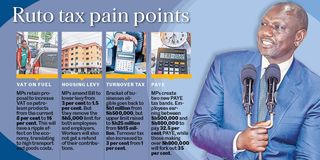Small traders at risk on bid to force them into the e-tax system

Entrepreneurs are facing tough times ahead following Parliament’s approval of the proposal by the Kenya Revenue Authority (KRA) to have the smallest of businesses brought under the tax net through a requirement that they use the Electronic Tax Invoice Management System (Etims) to record sales.
Entrepreneurs are facing tough times ahead following Parliament’s approval of the proposal by the Kenya Revenue Authority (KRA) to have the smallest of businesses brought under the tax net through a requirement that they use the Electronic Tax Invoice Management System (Etims) to record sales.
This would provide KRA with a 24-hour view of their operations, seeing transactions as they happen, in order to tax them.
The National Assembly’s Finance and National Planning Committee, in its report on the Finance Bill, 2023, rejected calls by multiple stakeholders to delete or amend a proposal that only invoices generated through Etims would be accepted for tax purposes, despite concerns that the action risks driving many small enterprises out of business.
Should the Bill pass, large firms that supply to the micro, small and medium-sized enterprises (MSMEs) would shun them as they will be limited to dealing with only businesses that comply with Etims.
Many stakeholders who appeared before the committee during its public engagement forums urged the committee to delete or amend the clause.
“It will negatively impact the mama mbogas [small-scale green grocers] and the informal sector. It’s also not clear the grounds on which [KRA] will exempt certain persons from the requirement to obtain the electronic tax invoice,” argued corporate and commercial law firm, Anjarwalla & Khanna. The firm urged the committee to consider that small businesses cannot afford to procure electronic tax devices.
“The committee observed that [Etims] was in place and [KRA] would provide administrative guidelines to clarify the issues raised on the implementation of the system. Therefore, their proposal to delete was rejected.”

A point-of-sale gadget that digitally records all sale transactions and issues digital receipts. The Electronic Tax Invoice Management System is integrated with such gadgets.
“The committee rejected the proposal because the use of electronic tax invoices is meant to enhance compliance and seal revenue leakage,” the committee said.
Other stakeholders have warned that implementation of Etims on small enterprises poses a big risk to their existence, as well as the many low-skill jobs they create, that accommodate the youth and women who would, otherwise, be jobless.
Kenya’s informal sector employed 16 million people last year, having created 702,900 new jobs during the year, according to the Economic Survey 2023.
“MSMEs are not registered for Value Added Tax (VAT) purposes as they have not met the threshold for VAT registration. Consequently, businesses will shun trading with MSMEs as such traders are not able to generate valid tax invoices. This will negatively impact the MSMEs operating in the country,” argues professional services firm, PricewaterhouseCoopers (PWC).
The Institute of Public Accountants of Kenya (ICPAK), however, argues that being in the piloting stage, the Etims still require more time before it can be relied on to enhance compliance in other areas apart from VAT.
“Further, it could negatively affect MSMEs who could be edged out of business by compliant large firms and multinationals. This will negatively affect businesses at the bottom,” ICPAK says.
Mobile money transfer:
The committee has ditched a plan to raise the cost of sending money through mobile phones.

Treasury had proposed in the Finance Bill, 2023 to raise the excise tax on mobile money charges from 12 per cent to 15 per cent, a proposal that attracted criticism from the public.
Treasury had proposed in the Finance Bill, 2023 to raise the excise tax on mobile money charges from 12 per cent to 15 per cent, a proposal that attracted criticism from the public. The committee chaired by Molo MP Kuria Kimani on the Bill, however, recommended against raising the tax.
“The committee rejected the proposed deletion of Clause 43 (b) (iii). However, the committee amended the clause by retaining the excise duty rate at 12 per cent in order to harmonise with money transfer services of the banks,” it stated. Stakeholders had petitioned the committee to rule against the decision by Treasury on grounds that it would greatly impact citizens who rely on mobile money services in their day-to-day activities.
Beauty products:
Users of beauty products, including wigs, fake beards and human hair, which the Finance Bill had proposed to slap a five per cent tax, will also be relieved, should Parliament approve the committee’s recommendation to drop the proposal.

Cosmetics shops on Dubois Road in Nairobi in August 2020. Users of beauty products, including wigs, fake beards and human hair, which the Finance Bill had proposed to slap a five per cent tax, will also be relieved, should Parliament approve the committee’s recommendation to drop the proposal.
“The committee agreed with the stakeholder and deleted Clause 43 (a) (vi) to allow the industry to recover from the post-covid recession,” the Committee stated. Stakeholders who appeared before the committee argued that the tax would negatively impact the growth of the beauty industry which employs many persons.
Pay-as-you-earn (Paye):
The committee has proposed a new salary tax band, which will see anyone earning above Sh500,000 monthly taxed at a higher rate.
In addressing concerns on the Finance Bill, 2023- which had proposed a 35 per cent Paye tax on all workers earning above Sh500,000 monthly.
Effectively, should the committee’s proposals be enacted into law, workers earning between Sh500,000 and Sh800,000 monthly will be taxed Paye at the rate of 32.5 per cent. Those who earn more than Sh800,000 monthly will pay 35 per cent.
Tax on fertiliser, sugarcane transport:
The committee has accepted a proposal to retain a zero-rated tax on the transportation of sugarcane to factories as well as on fertiliser and other inputs used to manufacture fertiliser.
This follows a petition by West Kenya Sugar Company Limited, which had cautioned that placing the items under a tax-exempt regime as recommended in the Finance Act, 2023 would drive up the cost of production of sugar and fertiliser.

Workers arrange bags of subsidised fertiliser at the National Cereals and Produce Board depot in Elburgon, Nakuru County. The National Assembly’s Finance and National Planning Committee has accepted a proposal to retain a zero-rated tax on the transportation of sugarcane to factories as well as on fertiliser and other inputs used to manufacture fertiliser.
Almost all countries apply preferential rates to some goods and services, making them either “zero-rated” or “exempt.”
For a “zero-rated good,” the government doesn’t tax its retail sale but allows credits for VAT paid on inputs. This reduces the price of a good. Governments commonly lower the tax burden on low-income households by zero-rating essential goods, such as food and utilities or prescription drugs.
But if a commodity business is “exempt,” the government doesn’t tax the sale of the good, but producers cannot claim a credit for the VAT they pay on inputs to produce it.
Boda boda driving licences:
The committee has also rejected a proposal by the Boda Boda Association to slash renewal or application fees for the new-generation driving licenses to Sh500 from Sh3,000.
The lobby had requested the introduction of a new amendment to the Second Schedule of the Traffic (Driving Schools, Driving and Driving Licenses) Rules 2018.
The request by the association however hit a wall and its members will continue parting with Sh3,000 to obtain or renew the new-generation permits.
“The committee acknowledged the proposal, however, it was rejected,” the committee said in its report on the Finance Bill, 2023.





